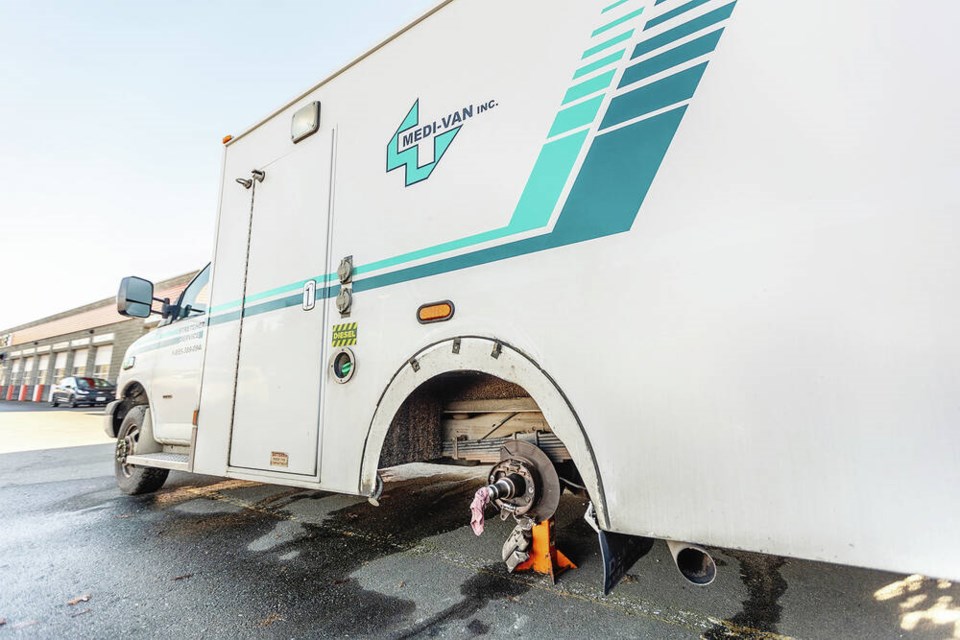Heart patient Randall Krall was strapped to a stretcher in the back of a Medi-Van that was approaching the summit of Malahat highway when he felt the vehicle’s wheel-wobble intensifying.
With no call-cord within reach to alert the driver — and having felt the van vibrating since it departed Royal Jubilee Hospital in Victoria for Nanaimo Regional General Hospital — the 76-year old panicked.
“I coudn’t do anything to alert the driver,” said Krall, who was one of three patients being transported.
There was an attendant in the back of the van, but Krall doesn’t remember any kind of reaction. The Nanaimo man was partially sedated at the time of the Nov. 21 incident, having had heart surgery earlier at Royal Jubilee Hospital, and didn’t think to raise his voice.
“I was between the driver’s wheel and the back wheel, so I was feeling the vibration right away. This thing was bumpy all the way through to the Malahat until it gave up.”
On the Malahat, he felt the scraping of metal on the road and the vehicle dropping down, he said in a phone interview from his home in Nanaimo on Monday. That’s when he knew the wheel had come off.
The driver operating the privately contracted medical transport vehicle was able to pull over onto the side of the highway, said Krall.
Fortunately the weather was good, it was about midnight — so there were few vehicles on the road — and the van, which was travelling highway speed, was heading uphill toward the summit rather than down the north side.
It took about 30 minutes for another Medi-Van to arrive. Krall, still in his hospital gown, was walked about 10 metres to a waiting stretcher, then hoisted into the vehicle to continue the trip.
Greg Leiman, Medi-Van Canada manger for Vancouver Island, confirmed the wheel came completely off the van. “It’s unfortunate this happened but I’m glad everybody was OK.”
Leiman said the incident was a first for the company, adding a wheel coming off a vehicle “is fairly rare.”
“I think the driver did a good job pulling the vehicle over safely on the top of the Malahat,” said Leiman. “I give him credit there. It was a very unfortunate incident that happened. Everybody was safe … and I’m glad there wasn’t a long waiting period for the patients to get to their destination safely.”
Leiman, who was out of the country when the incident occurred, said the driver determined it wasn’t safe for a stretcher to be rolled on the side of the highway in the dark and thus patients were walked to the replacement van. He said he hasn’t yet received a full report from the driver.
Medi-Van Canada is a family-owned company that has operated in Canada since 1976, in Victoria since 2002, and throughout Vancouver Island since 2009. It transports non-emergency stable patients.
Island Health requires contracted drivers and attendants to hold at minimum an Occupational First Aid designation, while some have their primary care paramedic designation.
Krall, a lifelong Nanaimo resident who has had heart trouble for about a decade, had angioplasty surgery this month to open up his arteries to increase blood flow to his heart.
“I’m grateful to be alive to begin with, with my heart conditions,” said Krall.
The van was one of the older vehicles in the company’s fleet of 25 vehicles, and Krall wonders why the wheel problem wasn’t caught in a pre-trip inspection — something Leiman said the driver is required to do prior to every transport.
Leiman said he was told by Kal Tire in Langford, where the van was taken after the incident, that the wheel “shimmied loose.”
“It’s still under investigation so I don’t exactly know what happened or why this happened.”
Leiman said he is leading the investigation, gathering reports, and then reporting to Island Health.
Leiman couldn’t say when the van last underwent a formal inspection.
Island Health said its contractors hired to transport “non-emergency” patients are required to meet “stringent safety standards and ensure regular maintenance of their fleets.”



